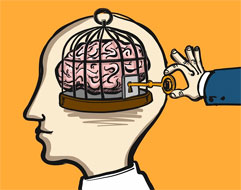
Those who Inhabit our Minds
Sometimes we feel the pull of strong emotional currents with our spouses that feel so much like the same emotional turmoil that we had with our parents...

There is something that we are all familiar with – it’s how we transfer feelings about people in our lives to other people. It’s quite amazing how it works. For example, sometimes we feel the pull of strong emotional currents with our spouses that feel so much like the same emotional turmoil that we had with our parents. Have you ever noticed that and wondered why it happens?
It’s called transference. To be more exact, it’s the transference of the significant feelings and attitudes that we experienced with parents to the other people in our lives. For example if your mother tended to be a on the over-protective side and you felt that she was trying to control and run your life, you could end up also feeling controlled by other people. But here’s the catch – you may feel they are controlling you even when they aren’t! What has happened is that this person is experiencing others as if they were her over-controlling mother.
A lot of times this whole process is unconscious – in other words the person isn’t aware that she is transferring her mother-relationship to her husband or her boss or her best friend. If you were to say to her that she is doing this she might even deny it – but deep down everyone wants to know the truth. Their  good inclination is very strongly programmed to search and seek out the truth and to live within the domain of reality and truth – not some fantasy that the evil inclination invents for us that your best friend or your daughter is actually your “intrusive” or “self-centered”, or “rejecting and critical” mother figure!
good inclination is very strongly programmed to search and seek out the truth and to live within the domain of reality and truth – not some fantasy that the evil inclination invents for us that your best friend or your daughter is actually your “intrusive” or “self-centered”, or “rejecting and critical” mother figure!
Transference is always happening to some degree whenever we are involved with people. One question we need to ask is: Are the emotions being transferred positive or negative? Because transference strongly affects our self-esteem, our relationships with others and our ability to maintain function, we need the self-awareness to sort through these distorted fantasies and see what we’re doing to ourselves.
Spiritually speaking, transference is mainly an interference with our faith in G-d. This is because it’s impossible to relate to G-d “as if” He were a person. Our relationship to G-d cannot be based on a template of any human relationship that we’ve ever had. This is why it is so critically important that we identify the people who “inhabit” our minds and how we are projecting our memories of those human relationships onto G-d.
As I said, there are two basic types of transference that we can distinguish. One is primarily positive and the other is primarily negative. They can also be mixed. There is no limit to the variety of ways that transference can take place. The positive transference don’t seem to hurt us very much but they actually do. For example when we over-idealize and even idolize certain people, expecting them to be almost perfect, and then we end up getting hurt and disappointed when we find out that they aren’t what we expected them to be – they aren’t G-d and can never ever substitute for a connection to Him.
Transference happens frequently between husband and wife. Either one of them can experience the other as their mother or father and it doesn’t matter whether the person that they are transferring onto or from is a male or a female. What counts most are the feelings that they’re having. It’s also not always that you relate to your spouse like your mother, for example, it could be sometimes like your mother and at other times like your father or even your big brother. If you grew up with extended family like grandparents in the house those relationships could also have been strong enough to get transferred later in life.
If a transference is a distortion that interfere with our relationships and our service to G-d, why does G-d give them to us? “Tune in” next week for the answer to this important question.







Tell us what you think!
Thank you for your comment!
It will be published after approval by the Editor.